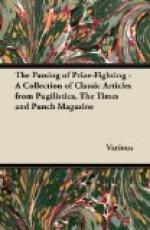LAXITY IN QUOTATIONS.
Among the many privileges which I propose to claim as a set-off for what are called advancing years is a greater laxity in quotation. When I have made a quotation I mean that that shall be the quotation, and I don’t intend to be driven either to the original source or to cyclopaedias of literature for verification. DANTE, for instance, is a most prolific fount of quotations, especially for those who do not know the original Italian. If I have quoted the words “Galeotto fu il libro e chi lo scrisse” once, I have quoted them a hundred times, always with an excellent effect and often giving the impression that I am an Italian scholar, which I am not. But surely it is not usual to abstain from a quotation because to use it would give a false impression? I am perfectly certain, for instance, that there are plenty of Italians who quote Hamlet, but know no more of English than the words they quote, so I dare say that brings us right in the end.
Then there is the quotation about “a very parfitt gentil knight,” or words to that effect. At the moment of writing it down I felt that my version was so correct that I would go to the scaffold for it; but at this very instant a doubt insinuates itself. Is “parfitt” with two “t’s” the right spelling?
It is related somewhere that TENNYSON and EDWARD FITZGERALD once conspired together to see which of them could write the most Wordsworthian line, and that the result was:—
“A Mr. Wilkinson, a clergyman.”
But there was no need for TENNYSON to go beyond his own works in search of such an effect. He had already done the thing; and this was his effort, which occurs in The May Queen:—
“And that good man, the clergyman, has told me words of peace.” This sounds as if it could not be defeated or matched, but matched it certainly was in Enoch Arden. After describing Enoch Arden’s death and the manner in which he “roll’d his eyes” upon Miriam, the bard informs us:—
“So past the strong heroic soul
away.
And when they buried him the little port
Had seldom seen a costlier funeral.”
But I feel that I have strayed beyond my purpose, which was to claim a certain mitigated accuracy in quotation for those who suffer from advancing years.
* * * * *
“——,
chambermaid at the —— Hotel, ——,
was charged
yesterday with stealing two
diamond rings and a diamond and
sapphire broom worth L80.”—Daily
Paper.
Yet Mr. CHAMBERLAIN refuses to impose a Luxury Tax.
* * * * *
From a list of the German Peace-delegates:—“Baron von Lersner, chief of the preliminary mission and ex-secretary of the German Embassy in Washington. He was also formerly attached to the German Embassy in Wales.”—Belfast News Letter.
This sounds like another injustice to Ireland.




